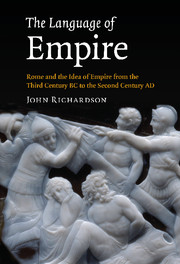 The Language of Empire
The Language of Empire Book contents
- Frontmatter
- Contents
- Preface
- List of abbreviations
- 1 Ideas of empire
- 2 The beginnings: Hannibal to Sulla
- 3 Cicero's empire: imperium populi Romani
- 4 The Augustan empire: imperium Romanum
- 5 After Augustus
- 6 Conclusion: imperial presuppositions and patterns of empire
- Appendix 1 Cicero analysis
- Appendix 2 Livy
- Appendix 3 Imperium and provincia in legal writers
- Bibliography
- Index
3 - Cicero's empire: imperium populi Romani
Published online by Cambridge University Press: 01 October 2009
- Frontmatter
- Contents
- Preface
- List of abbreviations
- 1 Ideas of empire
- 2 The beginnings: Hannibal to Sulla
- 3 Cicero's empire: imperium populi Romani
- 4 The Augustan empire: imperium Romanum
- 5 After Augustus
- 6 Conclusion: imperial presuppositions and patterns of empire
- Appendix 1 Cicero analysis
- Appendix 2 Livy
- Appendix 3 Imperium and provincia in legal writers
- Bibliography
- Index
Summary
The period between Sulla's resignation from the dictatorship in 79 BC and the establishment of the power of Augustus after the battle of Actium in 31 is, for any writer on the constitution and structure of the Roman state, dominated by one individual, the consul of 63 BC, M. Tullius Cicero. The reason for this is obvious but bears repeating. The sheer bulk of Cicero's surviving literary output, in terms of speeches delivered to the senate and people or in the law courts, of works on philosophical and rhetorical subjects and of correspondence with his friend Atticus and with his other friends and associates, is extraordinary, especially when compared with the paucity of material from the periods immediately preceding and following. It makes Cicero, as Elizabeth Rawson wrote, ‘almost unique among the great men of antiquity: because we know a great deal about him’. Cicero's predominance, from the point of view of modern students of ancient history, does not depend upon his significance as a leading politician in the turbulent events of the last decades of the Roman republic, whatever he himself would have us believe. Although he held the consulship and was for that reason alone one of the senior members of the senate from 63 BC onwards, the same could be said of many others, and, unlike most of his contemporaries, he made no attempt to display his prowess as a military commander, taking a provincia in Cilicia in 51 only because he was forced to do so.
- Type
- Chapter
- Information
- The Language of EmpireRome and the Idea of Empire from the Third Century BC to the Second Century AD, pp. 63 - 116Publisher: Cambridge University PressPrint publication year: 2008


